In the lead-up to the 2011 World Cup, Racing Metro (now Racing 92) owner Jacky Lorenzetti met with his contingent of Fijian players, Sireli Bobo, Jone Qovo, Josh Matavesi and Virimi Vakatawa, to pressure them into making themselves unavailable for their national side.
Lorenzetti had hired them to win him the Top 14 championship, and he didn’t care for four of his best players to be absent for six weeks, risking injury, representing a team that had no hope of winning the World Cup anyway.
The quartet should have been covered under World Rugby’s ‘regulation 9’, which was written to ensure the availability of players for major international fixtures within prescribed time frames without fear of reprisal or sanction from their club.
But this proved to be toothless when Lorenzetti reminded the players who buttered their bread and offered a financial sweetener on top for them to stay put in France.
It was a decision Matavesi would regret, later explaining; “I was put under a lot of pressure from the coaches at Racing.
“I was halfway on the plane, halfway not on the plane. The coach pulled me aside, and the president was with him, and said ‘A few boys aren’t going, we can offer you this if you don’t go’.
“At the time, the missus was pregnant, I wasn’t on a lot of money. In hindsight I was stupid, I missed an experience that millions of people would love to go to. Now I’ve got more control over me and my rugby, the World Cup is a big thing for me. I won’t ever turn that down again.”
For as long as there remains a commercial disparity between professional rugby in France and England (and, increasingly, Japan) and the southern hemisphere nations, players will continue to be offered attractive contracts enticing them north to maximise their earnings potential during what is a finite and often short-lived career.
This is problematic for the New Zealand and Australian unions because it weakens their domestic and Super Rugby competitions, it means that they lose control over their players in terms of coaching and, with few exceptions, it renders those players under their own rules unavailable for selection for the Wallabies and All Blacks.
Hence we have seen the emergence of ‘creative’ new contract arrangements for elite players like Sam Whitelock and David Pocock, which allow them to balance factors like lifestyle choice, enhanced earnings and prolonging their careers while still ensuring their availability for selection in the next World Cup cycle.
It is impossible for exceptions to be made for every player, however, and some like Scott Fardy, Will Skelton, Nic White, Charlie Faumuina, Steven Luatua, Tawera Kerr-Barlow and others have made the choice to leave, knowing that they are giving up further opportunity to represent their country.
Or perhaps not.
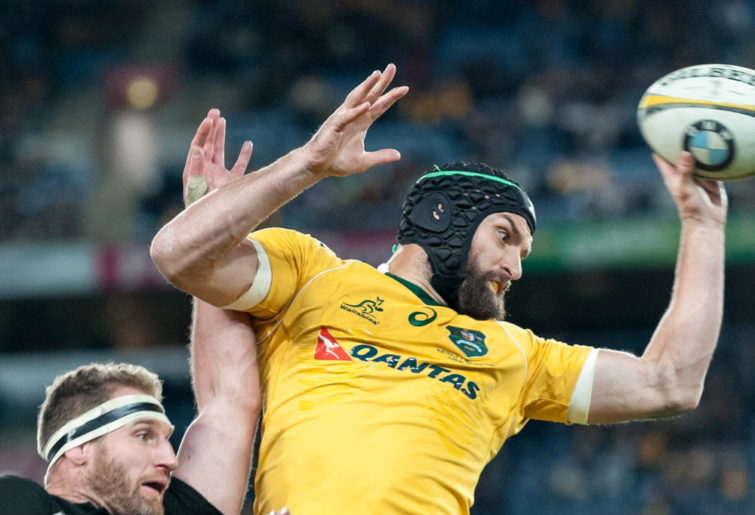
Scott Fardy (Tim Anger).
Based on form shown in the English Premiership, Wallabies coach Michael Cheika knows that Skelton and White will improve his side. Both have thrived at Saracens and Exeter respectively and are markedly better and more rounded players than when they left Australia.
White took just 30 seconds to stamp his mark on the English Premiership final with a sharp early try, while Skelton worked tirelessly defending the midfield as Saracens, inferior for the first 65 minutes, surged late to claim a 37-34 victory at a packed Twickenham.
Rugby Australia’s own eligibility rules provide for the selection of either player for the World Cup providing they have signed a contract with a Super Rugby franchise. Note that this does not have to be current – as is the case with Matt Toomua returning from Leicester to the Melbourne Rebels – but can be post-World Cup, at the completion of the 2020 English Premiership or potentially even the 2021 season.
There are two highly interesting but separate factors at play here. The first concerns the process, which amounts to Rugby Australia cleverly bending its own rules to ensure the Wallabies have the best opportunity to succeed in Japan but without opening the floodgates to allow all players to head north and expect to be picked for the Wallabies from overseas.
Skelton is presently contracted with Saracens until the end of the 2021 English season. If he and Rugby Australia are able to convince Saracens boss Mark McCall that the World Cup is an opportunity not to be missed for a player in the prime of his life and that he will give his all for Saracens for the 2020 season in return for being excused from the final year of his contract, then that would be an outstanding outcome for Australian rugby.
If McCall refuses to budge and points Skelton towards the letter of his contract, then the likelihood remains that Skelton will continue on overseas and be lost to the Wallabies.
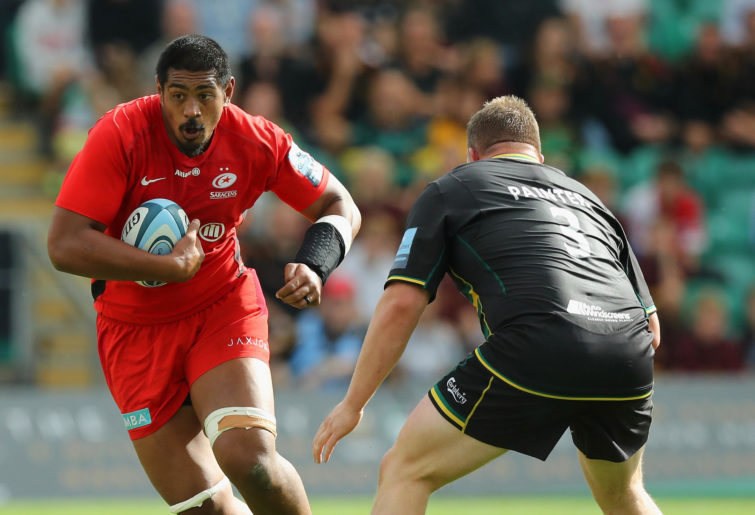
Will Skelton (David Rogers/Getty Images)
Another possibility is that Skelton stays with Saracens until the end of his contract in 2021 and plays in the World Cup by nature of having signed with a Super Rugby franchise for what would effectively be the 2022 season.
That avenue remains open to Rugby Australia, although it teeters uncomfortably close to the point of shamelessly mocking its own rules. Having Skelton return in 2020 is creative and purposeful, and Rugby Australia should be applauded if that happens. But having him return in 2021 to play Super Rugby in 2022 all so that he could play in the World Cup in 2019 doesn’t sit so well.
One thing that the selection of Skelton and White for this World Cup would not be, as was suggested by The Australian’s Wayne Smith over the weekend, is “unfair” to players like Rob Simmons and Tate McDermott.
This is the World Cup we are talking about, the best of the best. Any side serious about winning it chooses their best available side based on playing ability, not whose turn it is or what is notionally ‘fair’.
The other notable factor at play here is that to players of the ilk of Skelton and White and Matevesi, who unfortunately realised too late, the World Cup clearly retains a huge attraction, so much so that these players are prepared to recalibrate their blossoming careers around it.
This remains a compelling counter-argument to those who would simply blink and allow players to shift north on an open-slather basis and have the Wallabies and All Blacks picked from players at all points of the globe. There is value in the black jersey, and indeed the gold one, sufficient to hold the majority of elite players at home and, in the case of Skelton, White and Toomua, draw them back when there is a World Cup in the offing.
Also, there are increasingly encouraging signals that World Rugby is making progress gaining unanimous acceptance for its Global League. If this happens, it will provide another building block – the most crucial – to assist the southern unions in being able to shore up their playing stocks without sliding into a financial black abyss.
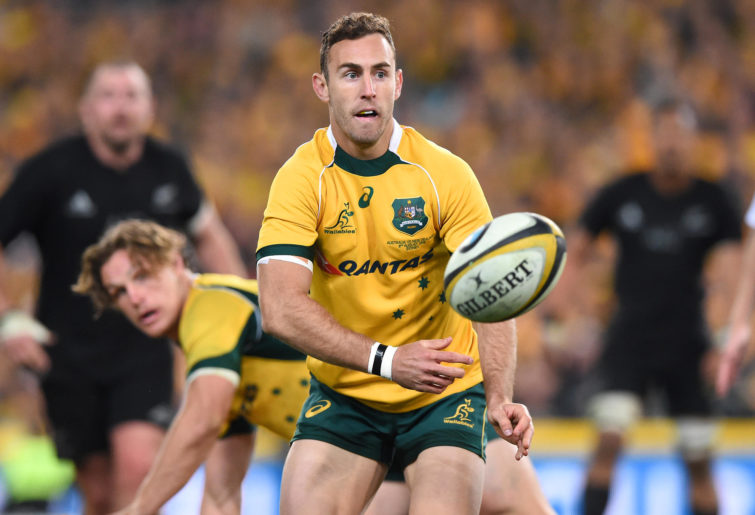
Nic White (AAP Image/Dave Hunt)
It is the Melbourne Rebels who are currently sliding into an abyss of their own making, failing to cement their play-off spot, falling to the Waratahs at home 20-15.
The contrast between the two sides in the first half couldn’t have been more vast – the Waratahs as composed and sure in their execution as the Rebels were anxious, fumbling and, once again, penalty prone. And while the Rebels mounted a strong second-half comeback, the Waratahs defence held firm, with Kurtley Beale decisively winning the kicking duel that dominated large sections of the match.
That the Rebels entered the match with a strategy to dominate field position via the boot and force mistakes from the Waratahs in their defensive half was one thing, but too many kicks from halfback Will Genia were made without a chasing winger in position and effectively achieved the opposite result.
Just as they did against the Hurricanes recently in Wellington, it was their inability to score during a period of sustained pressure just before half-time, that cost them dearly. A dropped ball by Anaru Rangi denied Quade Cooper a try, and referee Paul Williams got on the wrong side of a driving maul, sending it upstairs as an on-field ‘no try’ when a view from the other side might have suggested differently.
Most controversial, however, was Curtis Rona blocking Marika Koroibete from scoring with his left arm tucked into his shoulder as they crashed into contact. Would a try have ‘probably’ been scored without the illegal tackle? Michael Hooper’s presence was enough for Williams to generously assess no, but even so, what was inexplicable was his decision not to give Rona a yellow card for what was a deliberate penalty offence in the act of preventing a try.
As it happens, the Rebels season now hinges on squeezing out one win against either the Crusaders (away) or the Chiefs (at home). On the evidence of what we saw from Suva on Saturday evening, good luck with that project!
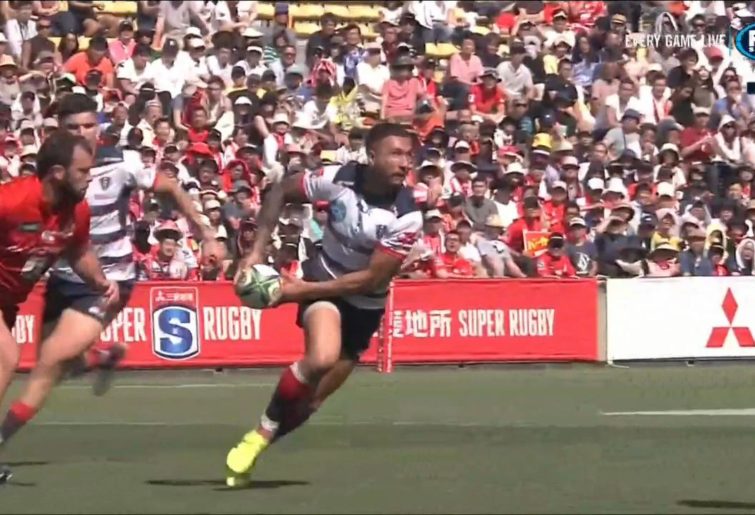
Melbourne’s Quade Cooper
Also crucial will be next week’s clash between the Waratahs and the Brumbies, with the Waratahs still alive in their quest for finals action. However, a potential firestorm is brewing.
Coach Daryl Gibson was disarmingly frank and open on Friday night, admitting that he has selected his side from week to week solely with a view to building continuity and consistency, not with an eye to managing the rotation of players.
Should the Waratahs win in Canberra, they then face the possibility of travelling to Invercargill in a must-win game against the Highlanders without up to five or six of their very best players, who have yet to sit out a second ‘rest week’.
Gibson’s strategy is akin to a Supercars team planting the foot from the opening flag and only worrying about a fuel stop if and when it comes around as opposed to strategically planning for the inevitable.
Either way, there is potential for a commotion to break loose in the final week – the Waratahs playing for a finals spot with what effectively will be their ‘B’ side, or else Gibson potentially going in with all of his best players intact, thus thumbing his nose at Michael Cheika, plus the other franchise coaches who have all done the right thing.
Perhaps the Brumbies will spare the angst by polishing off the Tahs to confirm top spot in the franchise. Certainly their 42-19 win over the Sunwolves was as professional and convincing as you’d expect – using their set-piece dominance to tame what was otherwise a willing and competitive Sunwolves side.
Every time teams run on to Prince Chichibu Memorial Stadium is another opportunity to wonder just how SANZAAR wasn’t able to convince itself and the Japanese Rugby Football Union that keeping the Sunwolves in Super Rugby, with their enthusiastic, tribal supporter base, strategic and commercial value post-World Cup, and consistently exciting brand of rugby, was something worth fighting tooth and nail for.
Chief entertainer this week was winger Semi Masarewa, who, among other things, could teach Koroibete how to transfer the ball to the correct hand and fend off defenders with the other.
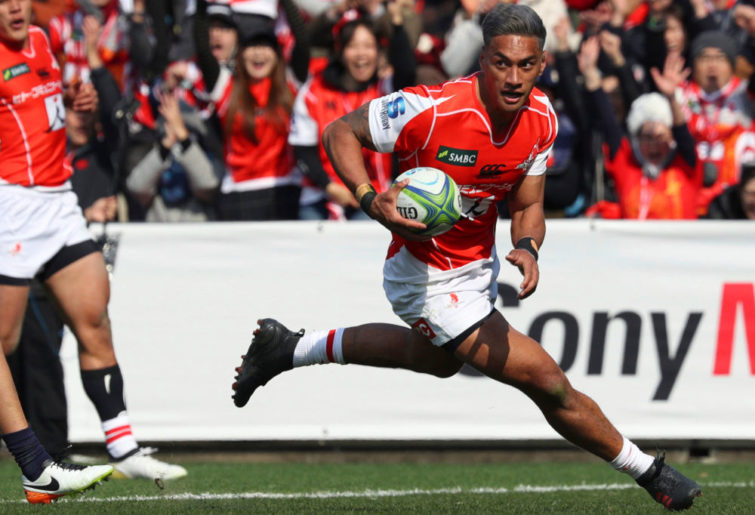
Sunwolves’ Timothy Lafaele (The Yomiuri Shimbun via AP Images )
The other big question for rugby fans is to consider how SANZAAR might be able to bottle the magic that played out in Suva – the pulsating atmosphere reverberating around a packed stadium, and two sides putting on a game for the ages, the Chiefs somehow climbing off the canvas at 20-0 down, to win going away, by 40-27.
It is becoming increasingly obvious that for Super Rugby to prosper – if indeed the four national unions truly want this competition to prosper in its own right – then it needs to be branded and promoted as a distinct entity, with marketing responsibility not left to the individual unions or pushed down to skint franchises.
It is not realistic to expect Rugby Australia or its four franchises to effectively promote events happening in Suva between two New Zealand sides. The context is wrong.
But rugby fans, no matter where they live, should be watching this stuff and remembering why they love the game in the first place. Just like how football fans, wherever they are around the globe, connect with Chelsea, Barcelona and so on.
Perhaps us rusted-ons are in on the secret, but to reclaim rugby’s mojo the competition itself, comprising many of the world’s elite players and containing magical matches such as this one, needs to be let off the leash and promoted in its own right in a cohesive and consistent manner in all territories.
Space precludes a detailed summary of the remaining matches. Suffice to say that the Blues and Bulls engaged in some sister-kissing in Auckland 22-22, the Hurricanes muscled up against the Sharks in a 30-17 niggle-a-thon and the Lions put the Stormers’ finals hopes in jeopardy with a convincing 41-22 win.
Further finals permutations for the bottom four qualifying spots are at this stage pointless. It’s all coming down to the final week, and perhaps a bonus point gained or lost sealing the fate of each contender.

































































































